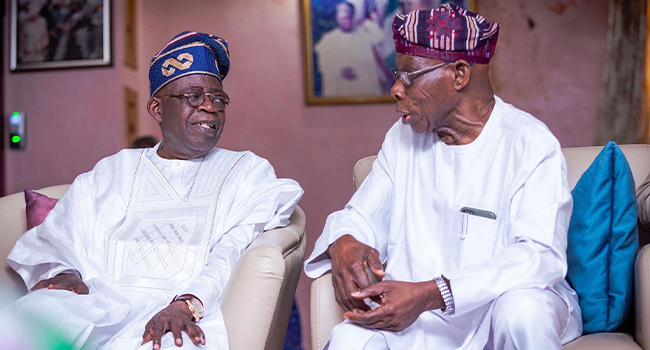Former President Olusegun Obasanjo has criticized President Bola Tinubu’s handling of fuel subsidy removal and exchange rate unification, labeling their implementation as flawed.
In a statement released on Sunday by his spokesman, Kehinde Akinyemi, Obasanjo voiced his concerns at a colloquium titled “Nigeria’s Development: Navigating the Way Out of the Current Economic Crisis and Insecurity” held at the Paul Aje Colloquium (tPAC) in Abuja on Saturday.
“Today, the government has taken three decisions, two of which are necessary but poorly executed, leading to economic hardship for Nigerians. These include the removal of subsidy, closing the gap between the black market and official exchange rates, and addressing the military coup in Niger Republic,” Obasanjo stated.
He emphasized that “the way forward is through production and productivity, which will foster trust in government leadership. There are no shortcuts to economic progress; it requires hard work and dedication.”
Obasanjo also criticized those who opposed his stance on the refurbished refinery in Port Harcourt, Rivers State, calling them “sycophants and spin doctors.” He argued that his attempt to partially privatize the refineries in 2007 was based on a thorough study, contrary to claims made by his critics.
Reflecting on President Tinubu’s administration’s first year, Obasanjo proposed solutions, including a 25-year development plan. “The economy does not obey orders, not even military orders. If we get it right, in two years, we will begin to see progress. It requires a change in characteristics, attributes, and attitudes by leadership at all levels to gain investor confidence,” he said.
He highlighted that Total Energy chose to invest $6 billion in Angola instead of Nigeria, attributing it to the current administration’s failure to handle the economy effectively. “Investors know us better than we know ourselves, and they are not taking us seriously. We need to shift from transactional to transformational leadership to gain their trust.”
Obasanjo stressed that consistent and transparent policies are crucial for stability and investment. “Tinkering with the exchange rate is not the answer. We need policy consistency to ensure stability and predictability, incentivizing both domestic and foreign investment. Honesty and transparency in government dealings are essential,” he asserted.
READ ALSO: Tinubu Arrives Lagos To Launch Lagos-Calabar Highway, Other Projects To Mark First Year In Office
Regarding the refinery, Obasanjo reiterated his skepticism about its operational timeline, noting that the same promises made decades ago are being repeated today. He called for a retrospective and forward-looking approach to address Nigeria’s crises and achieve a secure and prosperous future.
“Our economy has long suffered from poor policies, lack of sustainable plans, discontinuity, corruption driven by personal greed, incompetence, and a lack of patriotism,” Obasanjo lamented. “The same statements and proposed actions from forty-five years ago are being touted today. In 2007, I made a studied attempt to privatize the refineries, which was reversed by my successor, wasting $750 million in the process.”
Obasanjo concluded by calling for a multi-faceted approach to address the root causes of Nigeria’s challenges, urging both the government and citizens to reflect on past and present missteps to pave the way for a better future.










